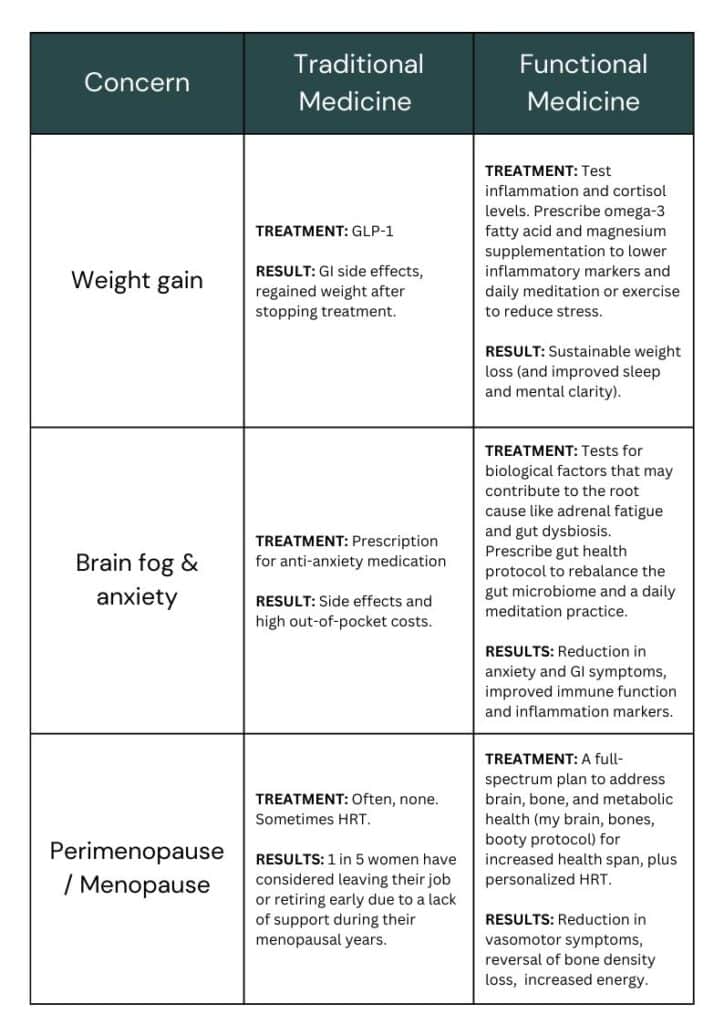I was really lucky to learn about functional medicine early in my career. I met Dr. Mark Hyman before I went to med school at Columbia and I’ll never forget what he told me: “Don’t get brainwashed.”
By the time I was a resident in Internal Medicine at Mount Sinai Hospital in New York City, I fully understood what he meant. The root cause of your brain fog might be in your gut; a nutrient deficiency might be the result of low thyroid function. But regular doctors are trained to point out disease—not to connect the dots between body systems.
Functional medicine treats the body like an ecosystem, getting to the root cause of symptoms.
The healthcare system I saw during residency was designed to treat disease rather than to generate health. And that hasn’t changed much. People are getting sicker and sicker, taking more and more pills to match a growing list of symptoms. Ninety percent of healthcare costs today are driven by chronic conditions including mental health.
As a functional medicine practitioner, I’m interested in:
- preventing and reversing chronic conditions
- identifying the root cause
- addressing symptoms through a wider range of tools including food as medicine, nutraceutical supplements, and exercise in addition to medications
I’m interested not just in treating disease, but in optimizing health.
This mission eventually turned into Parsley Health. It’s also the foundation of the work we are doing here as a community. I’m so excited about what we are going to do together in 2025!
Here’s a taste of what to expect in upcoming newsletters:
- A comprehensive preventative health checklist
- A deep dive into plant medicine
- An exploration of the ways inflammation is sabotaging your health goals
- A customizable longevity plan for your brain, bones, and booty
- And so much more!
If you want to start the year off strong, find a functional medicine practitioner. I promise you, it will make all the difference!
The functional medicine difference
Medications and surgery are life-changing and life-saving but traditional medicine usually fails to see symptoms as part of a bigger health ecosystem.
Functional medicine uses highly personalized holistic protocols to treat the root cause of your symptoms based on your personal genetic, biochemical, and lifestyle factors.
A functional medicine practitioner takes the time to understand the whole picture of your health; we look at lifestyle factors (diet, exercise, sleep, stress) and use advanced diagnostic tests (hormone imbalances, gut health, immune health, inflammation, nutrient imbalances) to understand how your biology and environment impact your health. Then we use that data to create a personalized plan for you to not just live longer, but actually feel better.
To be clear, functional medicine is not against prescribing drugs (and neither am I). But they are not the only tool. Functional medicine looks to lifestyle modifications, nutrition, supplements, and other integrative therapies before or alongside conventional treatments.
Here’s a few examples of how functional medicine treats common health concerns differently:

Functional medicine is especially important for women
Functional medicine isn’t a gender-specific approach—let’s be clear—but it is particularly well-suited to treating conditions that disproportionately affect women like:
Chronic and autoimmune conditions
Just under half of women (44%) report that they have a chronic health condition that requires regular monitoring, medical care, or medication. And nearly 80% of the approximately 24 million Americans diagnosed with an autoimmune condition are women.
By getting to the root cause and following individualized, data-driven protocols, Parsley patients saw a 65-75% decrease in medication usage, and within their first year, patients saw a 31% improvement in all autoimmune symptoms.
Fertility
One in five heterosexual women in the U.S. under 49 are unable to get pregnant after a year of trying, per the CDC.
Functional medicine treats hormone imbalances that impact fertility. At Parsley, 48% of members with a prior history of infertility who were trying to conceive, were successful.
Menopause
Forty percent of menopausal women say their symptoms interfered with their work performance or productivity weekly, and nearly one in five have quit or considered quitting because of their symptoms, according to survey data.
Using functional medicine protocols, 88% of Parsley patients improved or resolved their menopause symptoms within their first year of care.
Isn’t it expensive?
The thing that blew my mind in my mind when I was building Parsley was that this higher level of care can save patients (and the entire healthcare system) money by reducing the need for medications to manage chronic conditions. Parsley patients reduce their prescription drug usage by 65% on average.
What to look for in a functional medicine practitioner
Lots of start-ups offer the kind of diagnostic testing that functional medicine doctors use. So is it enough to order these labs yourself and bring it to your regular doc?
Not really. Practicing functional medicine is like learning to read a different language. Your regular doctor can flag the basics but you wont get the direction or insight into optimizing your health that a functional medicine doctor is trained to provide.
Look for a doctor who is trained in root cause analysis and certified by the Institute for Functional Medicine.
I built Parsley Health to take the guess work out of this process. Set up a free consult call with my team at Parsley today and take $150 off your membership when you sign up with the code RBMDCREW.